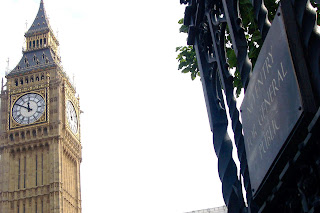Are our representatives "representative"?
 It's a commonly held belief. Our elected representatives simply aren't representative of their constituents. In the wake of the MPs' expenses scandal, this assertion is becoming even more accepted than previously, as many "ordinary people" see MPs and privileged and out-of-touch.
It's a commonly held belief. Our elected representatives simply aren't representative of their constituents. In the wake of the MPs' expenses scandal, this assertion is becoming even more accepted than previously, as many "ordinary people" see MPs and privileged and out-of-touch.Recently, some Conservative Prospective Parliamentary candidates were targeted by the GMB union who listed them as "unrepresentative of the region's workforce". Why? Simply because their main background is finance.
This is a bit unfair on these people, and is the kind of socially divisive tactic that the unions should have left in the 1970s. I don't care what a candidate's employment background is - I'm more concerned with what their ideas are. If the unions are really concerned about certain individuals being "unrepresentative of the workforce" they should perhaps take a look at their own officials before passing judgement on parliamentary candidates on the basis of something as superficial as employment history.
There is of course some substance though to accusations that our representatives are unrepresentative. The Conservative Party have justifiably come under fire for the difficulties they've got themselves into trying to address this problem. But they're not alone. Even Nick Clegg admitted the Lib Dems have some way to go in regards increasing the political participation of women and minority ethnic groups, while the Labour Party has tied itself up in knots over all women shortlists. There is also a notable shortage of gay parliamentarians - something that hasn't escaped the notice of groups like Stonewall.
But it is facile to assess how representative parliament is simply in relation to statistics on gender, ethnicity and sexuality. What makes parliament representative is not its ethnic make-up, but whether its members reflect their constituents' views, beliefs and concerns. A good, "representative" MP should also have a good knowledge of local issues and the challenges facing the area (I imagine the General Secretary of the GMB has a rather limited knowledge of the candidates' prospective constituencies!).
Of course, MPs are elected to represent all their constituents, not merely their supporters. Therefore, a representative MP would be sufficiently broad-minded to be empathetic towards the interests of those who may have an entirely different political outlook.
I recognise the need for parliament to become more representative. It would be a good start if, at the next election, more female MPs were elected, as well as those from ethnic minority groups. But that's not the real issue. If we want our MPs to be more "representative" then we need more candidates who are not lackeys of the established political elite. Whereas at one time parliament was "home" to a whole range of professions from miners to lawyers, nowadays, it is filled with professional politician types who have only ever worked in politics and have been groomed to become MPs.
I am a great believer that all this should start on a local level. It's little wonder people criticise the "unrepresentative" nature of parliament when many of our councillors are so painfully unrepresentative (of the public and their party) as to be laughable.
The GMB presumably want to go back to the days when they effectively selected the candidates, when a nomination from the union meant inheriting a seat for life. It's a bit rich for the champions of undemocratic machine politics to pick out a handful of individuals as "unrepresentative". At least they have worked in the real world, unlike many of our current MPs who have only ever worked in politics.
In a democracy, there is no practical way of imposing quotas on who does and doesn't get elected. When the main parties realise this and instead direct their energies into empowering "ordinary people" from all backgrounds into active politics, there will be the opportunity for a more representative and in-touch parliament rather than one run by the parties' electoral machines.
Comments
if they'd wanted to make it more valid then they should of researched all candidate and the constituency makeup
but then I doubt they'd get the answer they'd want
As you say, in the interests of balance it would have been preferable if they had researched all candidates rather than making snap judgements. But then they might have to admit that uncomfortable truths about some of our Labour MPs that they have supported for so long.